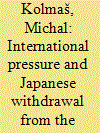|
|
|
Sort Order |
|
|
|
Items / Page
|
|
|
|
|
|
|
| Srl | Item |
| 1 |
ID:
178812


|
|
|
|
|
| Summary/Abstract |
The UK government's policy of support for shale gas extraction ended in November 2019 with the imposition of a moratorium on fracking (hydraulic fracturing) in England, and an admission that the policies to manage induced seismicity were insufficient. However, ambiguities remain regarding its scope, despite attempts at clarification. The concept of fracking to improve hydrocarbon production has evolved from defining a specific engineering process, using high volumes of water, to encompass other ‘unconventional’ methods to achieve the same end. We resolve the various definitions in a scientific, technical, regulatory and legislative context, robustly define unconventional extraction methods (circumventing the need to identify and quantify the various technologies available), and advocate the precautionary principle in drafting and interpreting regulations. Policy should be driven by the engineering of the bulk physical characteristics of the target rock, rather than by the current definitions based on injected fluid volume. To meet climate change concerns, the moratorium should be converted into a ban. In the interim, we argue that, in order to comply with the government's policy of ensuring safe and sustainable operations, the moratorium should be extended to all well stimulation treatments for unconventional hydrocarbon extraction, including acid stimulation.
|
|
|
|
|
|
|
|
|
|
|
|
|
|
|
|
| 2 |
ID:
184769


|
|
|
|
|
| Summary/Abstract |
Shaming in international relations has been extensively analysed as a normative practice that aims to persuade the target to comply with certain norms. Recently, IR scholars have identified cases, in which this process failed or antagonised the target. But although these studies have shown us how shaming works, they have not fully explained under what conditions shaming works. To remedy this, the article analyses the role of shaming in Japanese whaling controversy. In 2018, Japan announced its withdrawal from the International Whaling Commission, defying three decades of sustained international pressure. I identify two versions of shaming of Japanese whaling: premoratorium ‘soft' and post-moratorium ‘hard' shaming. The former, although less confrontational, had normative impact on Japanese society and policymaking, leading Tokyo to accept the moratorium and scale down on its whaling operations. The latter, marked by attacks of NGOs and heated discourse, had an opposite outcome and helped conservative policy entrepreneurs formulate a ‘cultural wars’ narrative that prevented the inception of anti-whaling norm. The reason for this difference, I argue, lies in Japanese domestic political culture, which played a defining role in the success/fail of shaming strategies. For shaming to be successful then, careful understanding of the target society is essential.
|
|
|
|
|
|
|
|
|
|
|
|
|
|
|
|
| 3 |
ID:
114493


|
|
|
|
|
| Publication |
2012.
|
| Summary/Abstract |
Moratorium, as a postponement or suspension of an activity, is widely used as a middle ground between YES and NO in the international legal arena, which reflects the value of compromise and cooperation in international intercourse. Moratorium in international legal setting is considered an option where countries are unable to perform their obligations for a reasonable time period, or an extraordinary situation requires countries to take exceptional measures or countries deem it necessary or indispensable for achieving some policy goals. The special values of moratoria shed light on difficult and complex issues to be addressed by States.
|
|
|
|
|
|
|
|
|
|
|
|
|
|
|
|
| 4 |
ID:
095235


|
|
|
|
|
| Publication |
2010.
|
| Summary/Abstract |
The UN's commitment to zero tolerance for sexual exploitation and abuse, which has been strengthened ever since the Secretary-General's 2003 'Bulletin', must be understood against the general public's non-tolerance of sexual misconduct by peacekeepers. While the UN has devoted its energy to restoring the public's confidence, the implementation of the policy cannot be effective, due to the limits of the UN's command authority, without the adoption of the same policy in contingent-contributing countries, who assume even greater roles under the revised model memorandum of understanding in 2007. Furthermore, not all victims approve the UN's zero tolerance pledge, out of fear that they may lose their only recourse to making a living. While it will likely take time to alleviate existing obstacles to align all the actors involved, the general public may not be tolerant enough to allow a further moratorium.
|
|
|
|
|
|
|
|
|
|
|
|
|
|
|
|
|
|
|
|
|